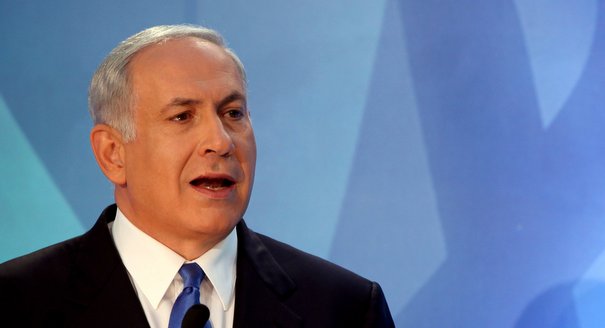Aaron David Miller, Karim Sadjadpour, Robin Wright
{
"authors": [
"Karim Sadjadpour"
],
"type": "legacyinthemedia",
"centerAffiliationAll": "dc",
"centers": [
"Carnegie Endowment for International Peace",
"Carnegie Europe",
"Malcolm H. Kerr Carnegie Middle East Center"
],
"collections": [],
"englishNewsletterAll": "menaTransitions",
"nonEnglishNewsletterAll": "",
"primaryCenter": "Carnegie Endowment for International Peace",
"programAffiliation": "MEP",
"programs": [
"Middle East"
],
"projects": [],
"regions": [
"Middle East",
"Iran",
"Israel"
],
"topics": [
"Nuclear Policy"
]
}
Source: Getty
5 Minutes With Benjamin Netanyahu
In considering Israel’s response to Iran’s nuclear ambitions, Prime Minister Netanyahu must set aside personal animus and consider the nature of Iranian politics and the character of the regime in Tehran.
Source: The Atlantic

As Jeffrey Goldberg reports, Ahmadinejad's combination of arrogance and ignorance has inspired similarly deep feelings of contempt in Israel, particularly within the Netanyahu family. This is understandable, given Ahmadinejad's odious rhetoric, but deeply concerning. When major decisions -- in this case, matters of war and peace -- are driven (and clouded) by personal animus, regret too often follows.
Much has already been written in this forum and elsewhere about the profound inadvisability of a military strike on Iran. Rather than reiterate the arguments, here are five key points that, if I could, I would convey to Bibi Netanyahu:
1. The Iranian regime is homicidal, not suicidal.
The decision to attack Iran rests heavily on one's character assessment of the Islamic Republic. While the regime has long shown itself willing to kill its own people (per capita Iran leads the world in executions and political prisoners), three decades of empirical evidence suggests that its paramount goal is to stay in power, not to achieve collective martyrdom.
On the contrary, despite the mullah's glorification of martyrdom, the Islamic Republic long ago began outsourcing suicide operations to Palestinians, along with Iraqi and Lebanese Shiites, just as America outsources jobs to India and China.
With its own arsenal of over 100 nuclear weapons -- not to mention the unconditional support of the world's greatest superpower -- Israel needlessly elevates Iran by labeling it an "existential threat."
2. Bombing the Islamic Republic prolongs its shelf life.
Given that Israel's underlying problem with Iran has more to do with the character of the revolutionary regime than with its nuclear ambitions (after all, Israel seems unconcerned about the Pakistani bomb), then the mathematics of an Israeli strike don't make sense.
While a successful military strike might delay Iran's nuclear progress by two years, it would likely destroy the most promising democracy movement in the history of the contemporary Middle East and entrench Tehran's most radical elements for years, if not decades, to come (incidentally, those who argue that there does not exist any pro-democracy movement in Iran don't realize they're abetting some in the Israeli far right who argue that there is no democracy movement to destroy).
As one Iranian democracy activist once told me, there should be "less focus on the gun, and more focus on the bandit trying to obtain the gun." Bombing Iran will strengthen the bandit, and only increase his desire to get the gun.
3. Iran's nuclear program is a money pit.
According to best estimates Iran has to date spent over $15 billion on its nuclear program (with nary a watt of nuclear energy in return), not to mention the billions of dollars that its nuclear intransigence has cost the country in terms of sanctions and lost foreign investment.
While the current debate understandably focuses on the dangers of Iran's nuclear ambitions, historians may well look back years from now and argue that the nuclear program was for the Islamic Republic what the invasion of Afghanistan was for the Soviet Union: a giant albatross that's been a massive burden to the country financially and isolated it politically, with few tangible gains.
4. The Islamic Republic's future will be determined by its oil, not its nukes.
The most formidable Israeli challenge to Iran will not likely be led by Prime Minister Netanyahu or Foreign Minister Avigdor Lieberman, but rather by alternative-energy players -- including Israeli alternative-energy players, such as technology entrepreneur and electric-car developer Shai Agassi -- who stand to help wean the world off fossil fuels.
To put things in perspective, a $1 drop in oil prices is approximately $600 million in lost annual revenue for Iran. Military action that would send oil prices skyrocketing makes it far less costly for Iran to continue supporting Hezbollah and Hamas, not to mention expand the ranks of bassij militia and Revolutionary Guards who rule by terror.
5. There are no easy solutions for dealing with Iran's nuclear aspirations.
In his own response to "The Point of No Return" yesterday, Marc Lynch eloquently laid out the dangers of the military option and concluded with the following assertion: "Goldberg's article has set off an important debate about how to deal with Iran. I hope that this debate reveals in all clarity that the military option should be off the table, and that more creative forms of diplomacy will be needed in the coming years." Unfortunately, as long as the debate on how to deal with Iran remains mired in the right-vs.-left question of whether war or diplomacy is the answer, we will be tempted to juxtapose the military option with too-general descriptions of the diplomatic alternatives.
If we could speak to Netanyahu, we would do well to acknowledge this candidly: Simply advocating what has become the most clichéd word in international relations, "engagement," is not to articulate a genuinely "creative form of diplomacy." The latter requires confronting a difficult set of issues -- one the Obama administration is grappling with now:
- How can Israel and the United States come to a common framework with a ruling clique in Tehran whose animosity toward both countries seems to have become an inextricable part of their revolutionary identity?
- How much Iranian enrichment can we live with?
- How can we design a sanctions regime that moderates Iran's behavior while causing minimal harm to the Iranian people?
- How can we effectively support Iranian democracy and human rights activists without undermining their independence and credibility?
- How can the United States, in particular, credibly shift toward a policy of containment, after years of insisting that a nuclear-armed Iran is unacceptable?
Unfortunately there are no easy answers to the Iranian conundrum, and no quick solutions -- military or diplomatic. We can start, however, by addressing the right questions.
This post is part of our forum on Jeffrey Goldberg's September cover story detailing the prospects and implications of an Israeli strike against Iran. Follow the debate here.
About the Author

Senior Fellow, Middle East Program
Karim Sadjadpour is a senior fellow at the Carnegie Endowment for International Peace, where he focuses on Iran and U.S. foreign policy toward the Middle East.
- What’s Keeping the Iranian Regime in Power—for NowQ&A
- How Washington and Tehran Are Assessing Their Next StepsQ&A
Aaron David Miller, David Petraeus, Karim Sadjadpour
Recent Work
Carnegie does not take institutional positions on public policy issues; the views represented herein are those of the author(s) and do not necessarily reflect the views of Carnegie, its staff, or its trustees.
More Work from Carnegie Endowment for International Peace
- The Gulf Monarchies Are Caught Between Iran’s Desperation and the U.S.’s RecklessnessCommentary
Only collective security can protect fragile economic models.
Andrew Leber
- Duqm at the Crossroads: Oman’s Strategic Port and Its Role in Vision 2040Commentary
In a volatile Middle East, the Omani port of Duqm offers stability, neutrality, and opportunity. Could this hidden port become the ultimate safe harbor for global trade?
Giorgio Cafiero, Samuel Ramani
- Europe on Iran: Gone with the WindCommentary
Europe’s reaction to the war in Iran has been disunited and meek, a far cry from its previously leading role in diplomacy with Tehran. To avoid being condemned to the sidelines while escalation continues, Brussels needs to stand up for international law.
Pierre Vimont
- What We Know About Drone Use in the Iran WarCommentary
Two experts discuss how drone technology is shaping yet another conflict and what the United States can learn from Ukraine.
Steve Feldstein, Dara Massicot
- Beijing Doesn’t Think Like Washington—and the Iran Conflict Shows WhyCommentary
Arguing that Chinese policy is hung on alliances—with imputations of obligation—misses the point.
Evan A. Feigenbaum












